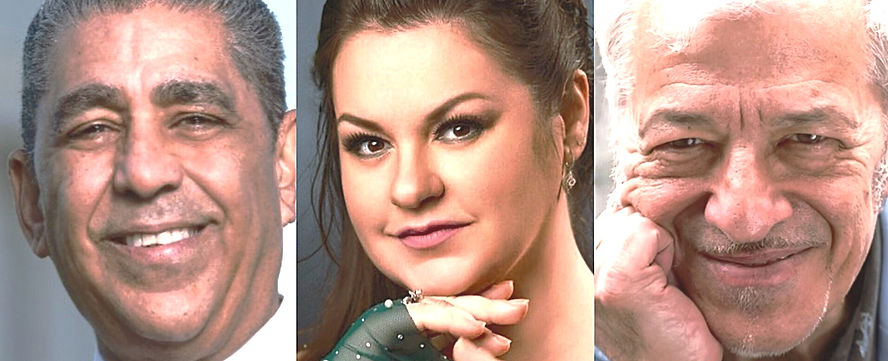Sheikh Mohammed Bin Zayed Honors Winners of the Zayed Sustainability Prize 2020
- Staff

- Jan 18, 2022
- 5 min read

His Highness Sheikh Mohammed bin Zayed Al Nahyan, Crown Prince of Abu Dhabi and Deputy Supreme Commander of the UAE Armed Forces, presented awards to the 10 winners of the Zayed Sustainability Prize with the participation of a number of world leaders, at the Prize’s annual awards ceremony, coinciding with the start of Abu Dhabi Sustainability Week.
Now in its 12th edition, the annual US$3 million Prize is the UAE’s pioneering sustainability award for recognizing innovative, impactful and inspirational solutions of small to medium-sized companies (SMEs), non-profit organizations (NPOs), and high schools. Evolving from its previous focus on energy-related solutions, in 2018, this was the second year in which the Prize offered awards across a wider scope of five categories in: Health, Food, Energy Water, and Global High Schools.
Speaking ahead of the awards ceremony, H.H. Sheikh Mohammed bin Zayed Al Nahyan, said: “Each year, the Zayed Sustainability Prize marks new achievements on its global mission to reward innovation and impact in areas of sustainability and humanitarianism. In this milestone year of strategic preparation towards the UAE’s next 50, we take inspiration from our shared commitment to honouring the vision of our founding father, Sheikh Zayed, who laid out the blueprint for a sustainable future. We look forward to further building on the Prize’s incredible global impact, so it may continue to transform millions of more lives for many years to come.”
H.H. added: “The UAE, under the leadership of HH Sheikh Khalifa bin Zayed Al Nahyan, President of the UAE, continues to reinforce sustainability through a number of programs and initiatives such as the Zayed Sustainability Prize, which gains momentum every year in light of its impact and key role in serving communities and spreading the UAE’s message of giving.”
In congratulating the winners, H.H. Sheikh Mohammed bin Zayed highlighted the importance of encouraging the next generation of pioneers and innovators to be sustainability champions and the significant role they will play in advancing their impact on socio-cultural and economic development. His Highness also praised the level of sophistication some of the projects display and the long-term impact that will have on a worldwide, as well as local, community level.
H.H. Sheikh Mohamed bin Zayed congratulated winners and presented awards across the Prize’s five categories; the Global High Schools category being split into six world region winners.
The event was attended by various heads of state, ministers and other senior-level dignitaries from the UAE and abroad, in addition to past winners, beneficiaries and 2020 finalists.
Health Category Prize Winner for Zayed Sustainability Prize
In the Health Category, Sweden’s GLOBHE received the award for its drone-based services and proprietary global drone data platform for helping in health disaster prevention and response. With over 3,600 drone pilots, in 48 countries, connected to automatic data analysis platforms, using Artificial Intelligence (A.I.), the solution has impacted 100,000 people through intervention of governmental and non-governmental organisations (NGOs) by addressing cholera and malaria epidemics, in Malawi and Lake Victoria.
Food Category Prize Winner for Zayed Sustainability Prize
Okuafo Foundation was the Ghana-based winner in the Food Category and was recognised for its smartphone application that utilises A.I., machine learning (ML) and data analytics to predict and detect crop diseases and infestations and offers recommended solutions, based on scientific knowledge, in real-time. The application has allowed farmers to reduce expenses on crop pesticides and increase crop productivity and harvests by up to 50 per cent, thereby increasing their profits and disposable income.
Energy Category Prize Winner for Zayed Sustainability Prize
In the Prize’s Energy Category, the 2020 winner was Electricians Without Borders (EWB). The international non-profit aid agency was recognised for its provision of high-quality solar equipment to refugee campsites and providing training to refugees to repair the equipment, thereby ensuring long-term access to electricity and resolving social issues such as safety concerns. To date, their innovative approach has impacted 8,000 lives in Cox’s Bazar, Bangladesh, the world’s largest refugee camp, who have benefitted from safe and sustainable lighting, leading to less crime, as well as spaces to rebuild their social and community life. Across its global operations, 50,000 people in 38 countries, have benefitted from 129 ongoing projects, providing over one million beneficiaries with improved access to electricity and water.
Water Category Prize Winner for Zayed Sustainability Prize
Ceres Imaging, from the USA, was this year’s winner in the Water category and was recognised for its proprietary spectral imaging sensors and A.I.-based analytics to optimise water use in agriculture. Ceres Imaging’s data-driven technologies have enabled more efficient irrigation practices and provision of enough water to satisfy the thirst and hunger of a growing global population. Ceres Imaging is presently serving approximately 1,000,000 acres of land, in the US and Australia.
Chair of the Zayed Sustainability Prize Jury and former President of the Republic of Iceland, H.E. Ólafur Ragnar Grímsson, said: “Each year, the winners of the Zayed Sustainability Prize continue to surprise and captivate us with innovative contributions that will positively transform some of the world’s most disadvantaged areas and vulnerable communities. They are an inspiration to people, young and old, and are absolutely key to delivering on the sustainable development priorities that affect us all.”
H.E. Dr. Sultan Ahmed Al Jaber, UAE Minister of State and Director-General of the Zayed Sustainability Prize, said: “We highly value the vision and directives of the UAE’s wise leadership which has been integral to the Prize’s success and objectives, while supporting the sustainability vision of the late Sheikh Zayed. I congratulate all the winners of this year’s awards for taking part in one of the most competitive awards cycles the Prize has seen, to date.”
His Excellency continued: “The objectives of the Prize continue to resonate with a whole new generation of pioneering innovators and future sustainability leaders, having already impacted 335 million people worldwide, directly or indirectly, adding that the Zayed Sustainability Prize also seeks to amplify the impact even further through initiatives such as the recently announced ‘20by2020’, which will apply sustainability solutions developed by winners and finalists’ to vulnerable communities in 20 countries by the end of this year.” In the Global High Schools category, six schools, each representing a world region, receive an award and high schools submit project proposals to build or augment a solution they have developed for their school or local community. The objective of this category, introduced to the Prize in 2012, is to inspire the young people to become pioneers, innovators and sustainability advocates who will contribute to a more sustainable future.
The Americas: Air Batalla, a private school in Colombia goal is to establish a greenhouse that will use seawater to create a micro-environment for the growth of beans, cucumbers, tomatoes and melons. Europe and Central Asia: United World College – Mostar, which is a private institution in Bosnia and Herzegovina, wishes to build the first environmentally-friendly building in the city, which will include solar panels, water saving technologies and insulation.
Sub-Saharan Africa: Hakimi Aliyu Day Secondary, a public school in Nigeria, goal is to produce various spices and vegetables all year round; as well as establish a centre for research.
Middle East and North Africa: Al Amal Junior High School in Morocco proposed the generation of water from clean energy, and the installation of two wells and a number of solar panels to power water pumping through the school.
South Asia: Bloom Nepal School, a private school in Nepal, wishes to convert organic waste into biogas and organic manure. The biogas produced can then be used for cooking, and to generate clean energy.
East Asia and Pacific: Eutan Tarawa Ieta Junior Secondary School, a public school in Kiribati, wants to install solar-powered rainwater tanks to generate clean, potable water. It will also convert some of the school grounds into a food production area for vegetables and poultry.
The Prize format allows for organizations to submit solutions that have affected communities or nations they serve, with the Health, Food, Energy and Water Category winners each claiming a US$600,000 prize fund. The Global High Schools category encourages entries by student-led sustainability projects they would like to implement for either their school or their surrounding communities.
For more information, visit: https://zayedsustainabilityprize.com/en
Photo credit: Hamad Al Kaabi / Ministry of Presidential Affairs






